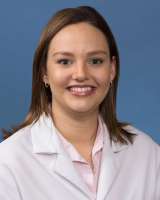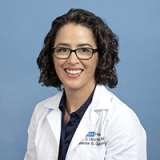Clinical Update
The UCLA Comprehensive Menopause Program
The significant physiological changes that occur around the time of menopause — when the ovaries begin to produce less estrogen, ultimately resulting in missed periods for 12 consecutive months — can profoundly affect short- and long-term health and quality of life. Every person with ovaries goes through it, starting as early as age 40 or as late as 60, and for many, it’s associated with symptoms that can include hot flashes, vaginal dryness and pain, mood and sleep disturbances, and changes in cognition and sexual health. Many of the same symptoms can occur during perimenopause — the transition to menopause, lasting from 2 to 10 years, when hormone levels decline. But in the U.S., more than half of people going through menopause or perimenopause receive no treatment.
The UCLA Health Comprehensive Menopause Program was recently established to deliver evidence-based, individualized care for the midlife person through the menopause transition and beyond. The program’s team of certified menopause physicians and collaborating specialists attend to the immediate, bothersome symptoms as well as partnering with patients on long-term strategies that can optimize their health.
“Menopause is both under-evaluated and undertreated,” says Rajita Patil, MD, CNMP, a UCLA OBGYN health sciences assistant clinical professor who directs the program. “Often, people going through menopause and/or their health care providers wrongly assume that this is just something people have to endure, and so it’s not discussed. In addition, many health care providers don’t have enough knowledge in the field of menopause to provide adequate clinical care.”

The program’s leadership — Dr. Patil along with associate program directors Erica Oberman, MD, CNMP, and Brittany Davis, MD, CNMP — are all credentialed as certified menopause physicians, which requires specialized training and continuing education. To address the myriad of issues of potential concern during menopause and perimenopause, the UCLA Comprehensive Menopause Program draws on a wide-ranging group of experts. In addition to the core team of UCLA OBGYN-certified menopause providers, this includes specialists in bone health, cardiovascular health, mental health, cognition, sleep, genitourinary health, breast health, integrative medicine, and cancer survivorship. Upon their initial visit, patients receive a comprehensive evaluation looking at their current health status and any future risks and can be referred to any of these specialists as needed.

“The rapid decline in estrogen through menopause affects every part of the body,” explains Dr. Davis, a UCLA OBGYN health sciences assistant clinical professor. “Because there has been a lack of education about menopause, many people associate it only with the hot flashes. Those are certainly important to address, but there are also other effects that many people are not aware of.”

As an example, Dr. Oberman, UCLA OBGYN health sciences associate clinical professor, points out that significant bone loss begins during the perimenopausal period. “Even though people aren’t feeling any symptoms from that, it can put them at higher risk for bone fractures at an older age, which can significantly impact their quality of life,” Dr. Oberman says. “That’s one of the reasons patient education is so important. When we see patients who are going through this transition, we begin the conversation about the importance of weight-bearing exercise.”
There are many misconceptions about menopause’s effects and treatments, the UCLA Comprehensive Menopause Program physicians note — particularly pertaining to hormone therapy, which was commonly prescribed for wide-ranging menopausal symptoms prior to a 2002 Women’s Health Initiative study that concluded it had more detrimental than beneficial effects. That well-publicized study, which resulted in a precipitous decline in hormone therapy, is now viewed by many experts as flawed, and a substantial body of research has subsequently demonstrated the safety and efficacy of the treatment — particularly early in menopause. Nonetheless, the findings from that single study continue to reverberate. “Understandably, many physicians who aren’t experts in this area have been hesitant to prescribe hormone therapy, and too often that space is filled by non-medical experts who are promoting unproven treatments,” Dr. Oberman says.
While hormone therapy can help many during menopause, it’s far from the only option. “People commonly associate a menopause treatment program with hormones, but there are many options that address patients’ symptoms,” Dr. Patil says. “We are committed to listening to our patients’ values and preferences, discussing all alternatives with them, and empowering them to arrive at a decision that best meets their needs.” She notes, for example, that for patients who aren’t good candidates for — or don’t desire — hormone treatment, there are many non-hormonal medications available, including a new FDA-approved drug for hot-flash management. The program also offers cognitive behavioral therapy, menopause group therapy, lifestyle change counseling, mind-body relaxation coaching, and pelvic floor physical therapy, as well as specialty care.
The program’s emphasis on education extends to both patients and physicians. “Unfortunately, because issues around menopause haven’t been well addressed in medical schools and training programs in the past, many health care providers in the community are not practicing evidence-based care for these patients,” Dr. Davis says. “Our goal is to educate not only our own patients but also trainees and colleagues both at UCLA and elsewhere.” The program will also have a strong research component, responding to an urgent need to learn more about an area of health that has historically been under-studied.
Dr. Patil believes anyone going through menopause or perimenopause can benefit from the services offered by the UCLA Comprehensive Menopause Program. “When patients come to us with symptoms, we view it as a unique window of opportunity not just to help them address what’s bothering them, but also to evaluate their short- and long-term health at a time when they are experiencing such important changes in their body,” Dr. Patil says. “We want to make sure they have the care they deserve that will allow them to live their best life.”